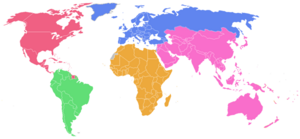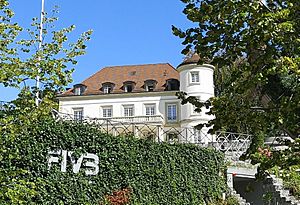Fédération Internationale de Volleyball facts for kids
 |
|

Map of the members of FIVB according to their confederation
|
|
| Abbreviation | FIVB |
|---|---|
| Predecessor | International Amateur Handball Federation |
| Founded | 20 April 1947 |
| Founded at | Paris, France |
| Type | Sports federation |
| Legal status | Governing body of Volleyball |
| Purpose | Sport governance |
| Headquarters | Lausanne, Switzerland |
|
Region served
|
Worldwide |
|
Membership
|
222 national associations |
|
Official languages
|
English, French, Spanish, Arabic, Portuguese, Russian |
|
President
|
Fabio Azevedo |
|
Main organ
|
Congress |
| Subsidiaries |
5
|
| Affiliations | International Olympic Committee |
|
Revenue (2017)
|
US$65.34 million |
| Expenses (2017) | US$60.54 million |
The International Volleyball Federation, often called FIVB (which stands for Fédération Internationale de Volleyball), is the main organization that controls all types of volleyball around the world. Its main office is in Lausanne, Switzerland. The current president is Fabio Azevedo from Brazil.
Contents
History of Volleyball's Global Body
Before the FIVB was created, volleyball was part of another group called the International Amateur Handball Federation. The FIVB officially started in France in April 1947.
In the late 1940s, different national volleyball groups in Europe wanted to create a worldwide organization for the sport. These talks led to a big meeting in 1947. Fourteen national groups from five different continents came together. From April 18 to 20, the FIVB was officially formed. A French person named Paul Libaud became its first president.
One of the first big goals of the 1947 meeting was achieved two years later. This was the start of the first major international volleyball event, the World Championship. In 1952, a women's version of this tournament also began.
In 1964, the IOC decided to add volleyball to the Olympic Games. By this time, 89 national groups had joined the FIVB. Later, in 1969, a new international event called the World Cup was introduced. In 1991, this World Cup became a way for teams to qualify for the Olympics.
After Paul Libaud retired in 1984, Rubén Acosta Hernandez from Mexico became the new president. The FIVB then moved its main office from Paris, France, to Lausanne, Switzerland. The organization worked hard to make volleyball popular all over the world. They started annual competitions for men and women, like the World League (in 1990) and the Grand Prix (in 1993). They also made Beach volleyball an Olympic sport in 1996. The rules of the game were changed to make it more exciting for people to watch.
On June 19, 2008, Wei Jizhong from China became the third president of the FIVB. He took over from Rubén Acosta during a big meeting in Dubai. The official change happened on August 24, 2008, in Beijing.
As of 2020, the FIVB had 222 national groups as members.
In 2022, because of the 2022 Russian invasion of Ukraine, the FIVB stopped all Russian national teams, clubs, and officials from taking part in any events. Russia also lost the right to host the 2022 FIVB Volleyball Men's World Championship.
Major Volleyball Tournaments
The FIVB organizes many exciting volleyball tournaments for both national teams and clubs.
National Team Competitions
These are big events where national teams from different countries compete.
- Men's Tournaments
- Olympic Volleyball: Happens every four years since 1964.
- Men's World Championship: Held every two years since 1949.
- Men's World Cup: Takes place every four years since 1965.
- Men's Nations League: An annual event since 2018.
- Men's Challenger Cup: Also an annual event since 2018.
- Men's U21 World Championship (Junior): For players under 21, held every two years since 1977.
- Boys' U19 World Championship (Youth): For players under 19, held every two years since 1989.
- Women's Tournaments
- Olympic Women's Volleyball: Happens every four years since 1964.
- Women's World Championship: Held every two years since 1952.
- Women's World Cup: Takes place every four years since 1973.
- Women's Nations League: An annual event since 2018.
- Women's Challenger Cup: Also an annual event since 2018.
- Women's U20 World Championship (Junior): For players under 20, held every two years since 1977.
- Girls' U18 World Championship (Youth): For players under 18, held every two years since 1989.
Club Competitions
These tournaments feature the best volleyball clubs from around the world.
- Men's Clubs
- Men's Club World Championship: Held every year since 1989.
- Women's Clubs
- Women's Club World Championship: Held every year since 1991.
Beach Volleyball Tournaments
Beach volleyball is also a big part of the FIVB's work.
- Olympic Games: Held every four years since 1996.
- World Championship: Held every two years since 1997.
- World Tour: An annual series of events since 1989.
The FIVB also organizes international beach volleyball tournaments for younger players:
- Youth Olympic Games: Held every four years since 2014.
- U23 World Championships: For players under 23, held every year since 2013.
- U21 World Championships: For players under 21, held every year since 2001.
- U19 World Championships: For players under 19, held every year since 2003.
- U17 World Championships: For players under 17, held every year since 2014.
The FIVB's main job is to plan and organize volleyball events worldwide. This includes setting rules for how teams qualify and how tournaments are played. They also decide on smaller details like player rules and where games will be held.
The FIVB helps organize continental volleyball events that are important internationally. This includes tournaments where teams qualify for the Olympics or World Championships.
The FIVB also has special programs to help volleyball grow around the world. They set up development centers in places where the sport is not very popular. They also provide support and equipment to organizations that need help meeting international standards. For example, the FIVB organizes workshops and courses for referees, coaches, and teachers to help grow volleyball from the ground up. Some of these programs include:
- Volley All Festival
- Good Net Project (started in 2019)
- School Volleyball Congress (in 2007)
Another important goal is to promote volleyball globally. The FIVB works to get media companies and sponsors interested. They do this by negotiating deals for broadcasting and covering major events.
The FIVB is also in charge of making sure volleyball rules are the same everywhere. In recent years, many rules have changed to make the sport more visible and appealing to sponsors and media. These changes include requiring "fashionable" uniforms, which are tight clothes meant to make players' bodies stand out. They also made big changes to how games are scored, like the rally-point system.
The FIVB is the highest authority in international volleyball. It handles important issues like doping, player transfers between countries, and checking players' nationalities. It also publishes the FIVB World Rankings, which are used to rank teams for international competitions.
Current Champions
This section shows the current champions in major FIVB tournaments for national teams and clubs.
National Team Champions
| Tournament | Senior (M) – (W) |
U23 (M) – (W) |
U21 (M U21) – (W U20) |
U19 (M U19) – (W U19) |
U17 (M U17) – (W U17) |
|
|---|---|---|---|---|---|---|
| World Championship | (Men) | |||||
| (Women) | ||||||
| Olympic Games | (Men) | N/A | N/A | |||
| (Women) | ||||||
| World Cup | (Men) | N/A | ||||
| (Women) | ||||||
| Volleyball Nations League | (Men) | N/A | ||||
| (Women) | ||||||
| Confederation | Senior | U23/U22 | U21/U20 | U19/U18 | U17/U16 | |
| Africa (CAVB) | (Men) | |||||
| (Women) | ||||||
| Asia & Oceania (AVC) | (Men) | |||||
| (Women) | ||||||
| Europe (CEV) | (Men) | |||||
| (Women) | ||||||
| North America (NORCECA) | (Men) | N/A | ||||
| (Women) | ||||||
| South America (CSV) | (Men) | |||||
| (Women) | ||||||
Club Champions
| Confederation | Tournament | Championship | |
|---|---|---|---|
| Club World Championship | Men | FIVB Volleyball Men's Club World Championship | |
| Women | FIVB Volleyball Women's Club World Championship | ||
| Africa (CAVB) | Men | African Clubs Championship (volleyball) | |
| Women | Women's African Clubs Championship (volleyball) | ||
| Asia & Oceania (AVC) | Men | AVC Men's Champions League | |
| Women | AVC Women's Champions League | ||
| Europe (CEV) | Men | CEV Champions League | |
| Women | CEV Women's Champions League | ||
| South America (CSV) | Men | Men's South American Volleyball Club Championship | |
| Women | Women's South American Volleyball Club Championship |
Beach Volleyball Champions
Intercontinental Beach Volleyball Events
| Olympic Games | World Championship | World Tour | |
|---|---|---|---|
| Men | and Christian Sørum (NOR) (2020) |
and David Schweiner (CZE) (2023) |
and Jonatan Hellvig (SWE) (2023) |
| Women | and Alix Klineman (USA) (2020) |
and Kelly Cheng (USA) (2023) |
and Taryn Kloth (USA) (2023) |
Under-Age Beach Volleyball Events
| Youth Olympic Games | U23 World Championship | U21 World Championship | U19 World Championship | U17 World Championship | |
|---|---|---|---|---|---|
| Men | and Jonatan Hellvig (SWE) (2018) |
and Maciej Rudol (POL) (2014) |
and Kyan Vercauteren (BEL) (2023) |
and Kristians Fokerots (LAT) (2022) |
and Yves Haussener (SUI) (2014) |
| Women | and Maria Voronina (RUS) (2018) |
and Nicole Laird (AUS) (2014) |
and Brecht Piersma (NED) (2023) |
and Yeva Serdiuk (UKR) (2022) |
and Kathryn Plummer (USA) (2014) |
World Rankings
The FIVB keeps track of how well national teams are doing. These rankings help decide which teams are seeded higher in international competitions.
Men's World Rankings
This table shows the top 20 men's volleyball countries in the world.
| Top 20 rankings as of 31 January 2024 | |||
| Rank | Change | Team | Points |
|---|---|---|---|
| 1 | 421.14 | ||
| 2 | 390.91 | ||
| 3 | 342.43 | ||
| 4 | 340.3 | ||
| 5 | 338.17 | ||
| 6 | 314.35 | ||
| 7 | 307.12 | ||
| 8 | 306.8 | ||
| 9 | 253.22 | ||
| 10 | 249.1 | ||
| 11 | 236.96 | ||
| 12 | 222.17 | ||
| 13 | 214.58 | ||
| 14 | 210.73 | ||
| 15 | 207.82 | ||
| 16 | 197.6 | ||
| 17 | 182.2 | ||
| 18 | 164.05 | ||
| 19 | 160.71 | ||
| 20 | 160.07 | ||
| *Change from 19 August 2023 | |||
| Complete rankings at volleyballworld.com | |||
Women's World Rankings
This table shows the top 20 women's volleyball countries in the world.
| Top 20 rankings as of 18 October 2023 | |||
| Rank | Change | Team | Points |
|---|---|---|---|
| 1 | 397.46 | ||
| 2 | 358.62 | ||
| 3 | 352.55 | ||
| 4 | 350.86 | ||
| 5 | 338.97 | ||
| 6 | 329.65 | ||
| 7 | 327.89 | ||
| 8 | 308.86 | ||
| 9 | 305.09 | ||
| 10 | 287.94 | ||
| 11 | 265.66 | ||
| 12 | 228.36 | ||
| 13 | 222 | ||
| 14 | 199.57 | ||
| 15 | 184.99 | ||
| 16 | 177.67 | ||
| 17 | 177.17 | ||
| 18 | 171.96 | ||
| 19 | 171.3 | ||
| 20 | 165.39 | ||
| *Change from 4 September 2023 | |||
| Complete rankings at volleyballworld.com | |||
Other Competitions FIVB Helps With
The FIVB also helps organize volleyball games at other big regional sports events, such as:
- Asian Games
- European Games
- Pan American Games
- Lusophony Games
- All-Africa Games
How the FIVB is Organized
The FIVB has a clear structure to manage volleyball worldwide.
- World Congress: This is the highest authority. It meets every two years to choose the President and other important members.
- Board of Administration: This group manages the FIVB overall. They watch over the work of national groups, continental groups, and special committees. They also appoint officials.
- Executive Committee: This committee is made of board members. Each member has specific jobs and is helped by various commissions and councils. Some of these include:
- Legal Commission
- Finance Commission
- Communication Commission
- Rules of the Games and Refereeing Commission
- Technical and Coaching Commission
- Medical Commission
- Development Commission
- Beach Volleyball Commission
- Athletes Commission
- Sports Events Council
- Beach Volleyball World Tour Council
- Judicial Bodies: These groups handle legal matters and disputes:
- FIVB Disciplinary Panel
- FIVB Appeals Panel
- FIVB Ethics Panel
- FIVB Tribunal
The FIVB also oversees five large continental groups:
- Asian Volleyball Confederation (AVC) for Asia and Oceania
- Confederación Sudamericana de Voleibol (CSV) for South America
- African Volleyball Confederation (CAVB) for Africa
- European Volleyball Confederation (CEV) for Europe
- North, Central America and Caribbean Volleyball Confederation (NORCECA) for North America
Each of these continental groups then manages many national volleyball groups in its area.
FIVB Heroes Campaign
"FIVB Heroes" is a special campaign by the FIVB. It aims to show off the amazing skills of volleyball players and make the sport more popular around the world. The campaign features 33 volleyball and 29 beach volleyball players from 19 countries. These players were chosen because they are outstanding in their sport.
FIVB Presidents Through the Years
 Paul Libaud (1947–1984)
Paul Libaud (1947–1984) Rubén Acosta Hernández (1984–2008)
Rubén Acosta Hernández (1984–2008) Wei Jizhong (2008–2012)
Wei Jizhong (2008–2012) Ary Graça (2012–2024)
Ary Graça (2012–2024) Fabio Azevedo (2024–)
Fabio Azevedo (2024–)
FIVB Sponsors
| Sponsors of the FIVB |
|---|
|
See also
 In Spanish: Federación Internacional de Voleibol para niños
In Spanish: Federación Internacional de Voleibol para niños


